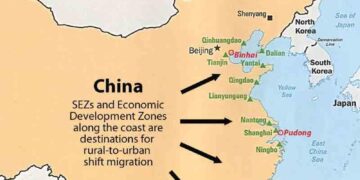D-8 Cairo Declaration: A Collective Commitment to Sustainable Tourism Advancement
In a landmark development aimed at strengthening unity and cooperation among its members, the D-8 (Developing-8) countries have embraced the “Cairo Declaration,” a strategic framework designed to propel tourism as a catalyst for economic prosperity and cultural connectivity. Unveiled during the recent D-8 Tourism Ministers’ summit in Cairo, this declaration unites nations such as Indonesia, Iran, Turkey, Egypt, Nigeria, Bangladesh, Malaysia, and Pakistan under a shared mission to revitalize their tourism sectors in the post-pandemic era.
With global travel rebounding—international tourist arrivals surged by over 60% in 2023 compared to pandemic lows—the timing of this initiative is critical. The declaration not only champions environmentally responsible tourism but also aims to deepen intercultural understanding by showcasing the diverse heritage embedded within each member state. This collaborative vision promises transformative impacts on regional tourism dynamics.
Core Pillars of the Cairo Declaration: Building Sustainable Tourism Foundations Across D-8 Nations
The Cairo Declaration establishes an integrated approach that prioritizes sustainability while leveraging each country’s unique cultural and ecological assets. It reflects an ambitious commitment from all eight members to harmonize efforts toward long-term tourism resilience.
- Exchange of Expertise: Facilitating cross-border sharing of innovative practices and technological advancements tailored for sustainable destination management.
- Cultural Heritage Amplification: Jointly promoting rich traditions through festivals, exhibitions, and digital storytelling platforms that attract culturally curious travelers.
- Ecosystem Conservation: Coordinated actions aimed at protecting biodiversity hotspots and natural landscapes integral to eco-tourism experiences.
- Empowering Local Communities: Involving residents actively in planning processes ensures equitable benefits from tourism growth while preserving indigenous knowledge systems.
A robust monitoring mechanism will be instituted to evaluate progress regularly. This system will enable adaptive management strategies based on data-driven insights gathered across member states—ensuring continuous improvement aligned with sustainable development goals (SDGs).
Harnessing Collaboration & Innovation: Strategic Approaches Underpinning D-8’s Tourism Agenda
The adoption of the Cairo Declaration signals a new era where partnership forms the backbone of regional tourism enhancement. By pooling resources and expertise through joint ventures and capacity-building initiatives—including workshops focused on emerging trends—the D-8 countries aim to elevate their collective market presence globally.
- Digital Integration: Embracing smart technologies such as AI-powered travel assistants and virtual reality tours enhances visitor engagement while streamlining service delivery across destinations.
- Sustainable Eco-Tourism Models: Developing nature-based attractions that appeal specifically to environmentally conscious tourists seeking authentic experiences without compromising ecosystems.
- Cultural Immersion Programs: Designing exchange initiatives where tourists participate directly with local artisans or partake in traditional ceremonies fosters meaningful connections beyond sightseeing alone.
- Attracting Private Investment: Creating favorable policies encourages private sector involvement in infrastructure upgrades—from boutique hotels emphasizing green architecture to improved transport links facilitating seamless travel within member states.
This forward-thinking framework not only strengthens intra-D-8 ties but also positions these nations competitively within global markets increasingly favoring responsible travel options backed by innovation.
Maximizing Synergies: Recommendations for Deepening Intra-D-8 Tourism Cooperation
Tapping into collective strengths requires practical measures designed around ease of movement and unified branding strategies. Simplifying visa regulations through multi-entry or e-visas can significantly boost tourist flows between member countries—a strategy proven effective by ASEAN’s recent visa facilitation reforms which increased intra-regional visits by 15% annually since 2021.[1]
A coordinated marketing campaign highlighting signature attractions—from Indonesia’s Komodo dragons habitat conservation efforts to Turkey’s burgeoning culinary tours—can craft a compelling narrative showcasing diversity under one umbrella brand “Discover D‑8.” To support these endeavors effectively, establishing centralized digital platforms will facilitate real-time information exchange about best practices or emerging challenges faced across destinations within this bloc.
The role of infrastructure cannot be overstated; public-private partnerships should prioritize upgrading airports, railways connecting key cities like Istanbul-Cairo-Kuala Lumpur routes along with eco-friendly accommodations catering specifically towards niche markets such as wellness or adventure travelers.[2]
Cultivating ongoing dialogue via an annual dedicated “D‑8 Tourism Forum” would institutionalize collaboration channels ensuring sustained momentum beyond initial implementation phases while fostering innovation hubs focused on developing region-specific solutions addressing climate change impacts on coastal resorts or desert safaris alike.[3]
Diverse Cultures United: Charting a Resilient Future for D‑8 Tourism Through Collective Action
The ‘Cairo Declaration’ stands as a pivotal blueprint guiding eight dynamic economies toward sustainable growth anchored in mutual cooperation. By embracing shared responsibilities—from environmental stewardship through community empowerment—the agreement lays groundwork for enhanced economic diversification fueled by vibrant cultural exchanges.
As these nations embark upon implementing their commitments amid evolving global travel trends shaped increasingly by sustainability concerns—and technological disruption—they are well-positioned not only to attract higher volumes of discerning visitors but also ensure that benefits permeate local communities equitably.
Ultimately, success hinges upon steadfast dedication toward collaborative governance models capable of adapting swiftly whilst safeguarding heritage treasures unique both individually yet collectively emblematic of what makes the D‑eight alliance truly distinctive.
—
[1] ASEAN Travel Statistics Report 2023
[2] World Bank Report on Infrastructure Investment Trends – Asia & Middle East (2024)
[3] UNWTO Regional Forums Summary Document (2024)















